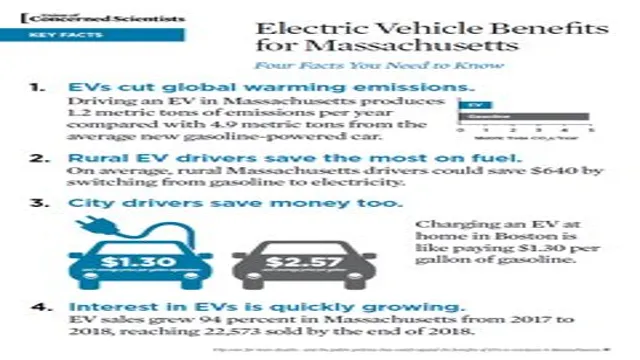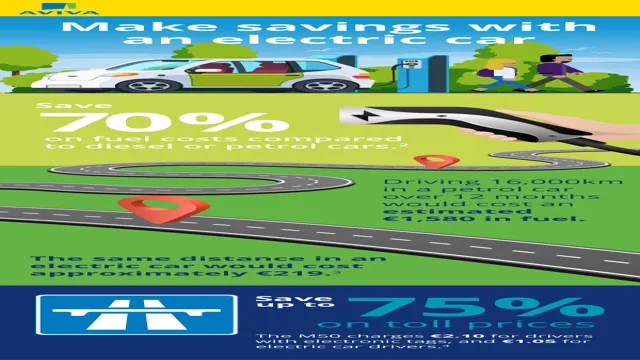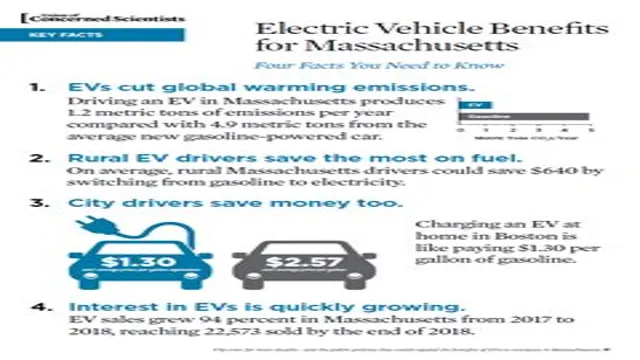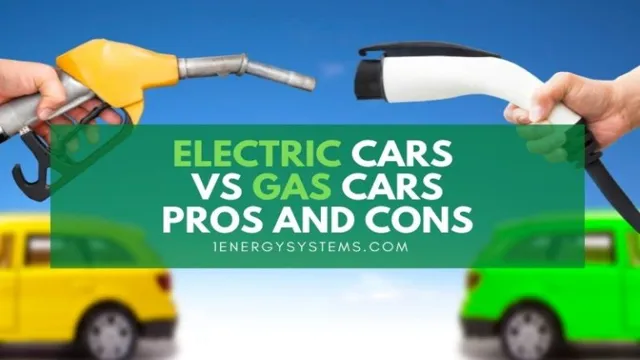Revving Up Your Ride: The Top Benefits of Switching to an Electric Car
Electric cars are a hot topic lately due to their numerous benefits and the increasing demand for sustainable transportation solutions. Have you ever considered driving an electric car? If not, you might be missing out on a lot. These vehicles run on electricity rather than fossil fuels, which makes them environmentally friendly and cost-effective in the long run.
In fact, several countries have already started to phase out gasoline-powered cars and are investing heavily in electric vehicles for a cleaner future. This blog will explore the benefits of electric cars, from their sustainability and affordability to their advanced technology and convenience. So buckle up and let’s explore what all the fuss is about!
Lower Maintenance Costs
When it comes to the benefits of driving an electric car, lower maintenance costs should definitely be at the top of the list. Unlike gas-powered vehicles, electric cars have fewer moving parts, which means there is less wear and tear on the vehicle over time. This translates to lower maintenance and repair costs for electric car owners.
To put it into perspective, an oil change for a gas-powered car can cost anywhere from $30 to $100, while the cost to replace a battery on an electric vehicle can range from $3,000 to $5,000. That being said, electric cars also require less frequent maintenance such as brake pad replacements since regenerative braking is used to slow the car down and recharge the battery at the same time. Not only does this translate to cost savings for the driver, but it’s also better for the environment as fewer resources are needed to produce and dispose of replacement parts.
All in all, lower maintenance costs for electric cars make them not only a financially smart choice, but also a sustainable one for the future.
No Oil Changes or Spark Plugs
One of the biggest benefits of electric vehicles is their lower maintenance costs. Unlike traditional gas-powered cars, electric vehicles don’t need oil changes or spark plugs. This means less frequent trips to the mechanic and fewer expenses overall.
This is because electric cars rely on electric motors instead of internal combustion engines, which have many more moving parts that require regular maintenance and replacement. Additionally, electric vehicles often have regenerative braking systems that use the motor to slow down the vehicle and recharge the battery, eliminating the need for brake pads and rotors. All in all, driving an electric vehicle means you can enjoy a lower cost of ownership and more time on the road.

Less Wear and Tear on Brakes
When it comes to maintaining a vehicle, the cost of replacing worn-out brake pads can add up quickly. However, by driving an electric vehicle, you can significantly reduce the wear and tear on your brakes, saving you money in the long run. With an electric car, the regenerative braking system utilizes the motor to slow down the car and recharge the battery, reducing the need to use the brakes as often.
This means that brake pads and rotors will last longer, and you won’t have to replace them as frequently. Over time, these savings can add up, making electric cars a more cost-efficient option for those concerned about maintenance costs. Plus, with less wear and tear on your brakes, your electric car’s braking system will perform better and last longer, providing you with added peace of mind and safety on the road.
By driving an electric vehicle, you can enjoy the benefits of lower maintenance costs and a more seamless driving experience.
Energy Efficiency
Electric cars are becoming increasingly popular due to the numerous benefits they offer. Firstly, they are incredibly energy-efficient. While traditional cars run on gasoline, electric cars rely on electricity from rechargeable batteries.
This means that they don’t produce harmful emissions that contribute to air pollution and climate change. Additionally, electric cars are much cheaper to operate. The cost of electricity is significantly lower than gasoline, and maintenance is also less expensive.
For instance, electric cars have fewer moving parts, which means fewer repairs and replacements of costly components. Furthermore, electric cars are convenient and silent to drive, making for a relaxing and enjoyable ride. Considering all these factors, it’s no wonder that more and more people are choosing to switch to electric cars and reap the benefits they offer.
Less Dependent on Fossil Fuels
If we want to lessen our dependence on fossil fuels, one effective way to do so is by increasing our energy efficiency. This means using less energy to perform the same tasks, whether it’s through more efficient appliances, better insulation, or changing our own personal habits. By reducing our energy consumption, we can reduce our reliance on fossil fuels, which not only helps the environment but can also save us money in the long run.
Think of it as using a smaller, more fuel-efficient car to get from point A to point B instead of a gas-guzzling SUV. It may not seem like much, but small changes can add up to a big impact over time. So, whether it’s by turning off electronics when they’re not in use or upgrading to a more efficient HVAC system, every effort we make towards energy efficiency can make a difference.
Reduced Greenhouse Gas Emissions
Energy efficiency is a key step towards reducing greenhouse gas emissions. By using energy-efficient appliances and optimizing the energy consumption in our homes, we can significantly reduce energy waste and lower carbon emissions. For instance, using LED light bulbs instead of traditional incandescent light bulbs reduces energy consumption by up to 80% and helps reduce greenhouse gas emissions.
Similarly, energy-efficient heating and cooling systems in homes reduce carbon emissions while improving overall comfort. Investing in energy-efficient appliances and taking steps towards optimizing our energy use is a smart way to reduce greenhouse gas emissions and tackle climate change. By doing so, we can reduce our carbon footprint and contribute towards building a more sustainable world for generations to come.
Cost Savings
One of the major benefits of driving an electric car is the cost savings. Electric vehicles are much cheaper to run than gasoline cars, since electricity is much cheaper than gasoline. Over the years, electric car owners save a significant amount on fuel costs.
Maintenance costs are also lower compared to traditional cars, as electric motors have fewer moving parts. Regenerative braking systems can also reduce brake wear, which means less money spent on brake pads. Electric cars also qualify for tax credits, which can make purchasing one more affordable.
Additionally, the environmental benefits of electric cars can lead to long-term cost savings, as they emit less greenhouse gases and rely on sustainable energy sources. Overall, switching to an electric car can save owners a considerable amount of money in the long run.
Tax Credits and Rebates
When considering ways to save money on energy bills, it’s crucial to take advantage of tax credits and rebates. These incentives are put in place by the government and utility companies to encourage homeowners to invest in energy-efficient appliances and upgrades. The savings can be significant, with some tax credits covering up to 30% of the cost of an upgrade or appliance.
Rebates can also lower the out-of-pocket cost of energy-efficient upgrades, making them more affordable for homeowners. Taking the time to research available tax credits and rebates can result in substantial long-term cost savings on energy bills, as well as a reduced carbon footprint. So why not take advantage of these incentives and invest in energy-efficient upgrades for your home? It’s a win-win situation for both your wallet and the environment.
Lower Fuel Costs
Lower Fuel Costs As gasoline and diesel prices continue to rise, it’s becoming more important than ever to find ways to save on fuel costs. Fortunately, there are several strategies you can use to reduce your fuel expenses and keep more money in your pocket. One of the easiest and most effective ways to cut fuel costs is to drive more efficiently.
This means avoiding aggressive driving behaviors such as hard braking and rapid acceleration, maintaining a steady speed, and avoiding excessive idling. Another strategy is to keep your vehicle well maintained. Regular oil changes, tire rotations, and other basic maintenance tasks can help your car run more efficiently and use less fuel.
Finally, consider changing your driving habits or even your vehicle if you’re consistently driving long distances or making a lot of stops and starts. Options such as carpooling, biking, or using a hybrid or electric car can all help reduce fuel costs and save you money over time. By taking these steps, you can enjoy lower fuel costs and keep more of your hard-earned money in your pocket.
Improved Performance
Electric cars have become more popular than ever, and for good reasons. One of the biggest benefits of driving an electric car is that it provides improved performance. Electric motors deliver instant torque, providing quick and responsive acceleration.
Because electric cars don’t require a traditional transmission, they can achieve maximum torque at any speed, resulting in a smooth and seamless driving experience. Additionally, electric cars have a lower center of gravity compared to traditional gas vehicles, which makes them more stable and agile on the road. So, not only can you enjoy the environmental and financial benefits of driving an electric car, but you can also experience a more thrilling and efficient driving experience overall.
Instant Torque
Electric vehicles (EVs) have revolutionized the way we look at automobiles, especially when it comes to performance. One of the most significant improvements in EV technology has been the concept of instant torque, which provides better acceleration than their gas-powered counterparts. This is because electric motors deliver maximum torque right from the get-go, unlike combustion engines that take time to build up speed.
With instant torque, EVs can accelerate from 0 to 60 mph in seconds, providing a thrilling driving experience. Not only does this improve performance on the road, but it also enhances the overall efficiency of the vehicle. The improved performance is why many consumers are choosing electric cars over traditional automobiles.
The future of EVs is bright, and with technology advancing, we can expect even better performance in the years to come.
Silent and Smooth Driving Experience
Improved Performance One of the most notable advancements in modern electric vehicles is the improved performance they offer. With electric motors, drivers can enjoy a silent and smooth driving experience unlike anything found in traditional gasoline-powered cars. Electric vehicles also have instantaneous torque, allowing them to accelerate quickly and reach high speeds in no time.
Additionally, regenerative braking systems allow electric vehicles to harness energy normally lost during braking and use it to recharge the battery. This improves overall efficiency and can increase the vehicle’s range. With advancements in battery technology and charging infrastructure, electric vehicles are becoming a more viable option for drivers who want an environmentally friendly and high-performing vehicle.
So, if you’re looking for a car that offers improved performance, low noise and a comfortable ride, an electric vehicle might be the right choice for you.
Conclusion
In conclusion, driving an electric car may seem like a daunting task for some, but the benefits are truly electrifying. Not only do you get to enjoy a silent and smooth ride, but you’re also reducing your carbon footprint and helping to save the planet. Not to mention the potential cost savings in the long run, as electric cars require less maintenance and fuel costs are lower.
So, whether you’re an eco-warrior or simply looking for a smarter and more efficient way to get around, driving an electric vehicle is the way to go. Trust us, you won’t be shocked by how amazing it feels!”
FAQs
What are some advantages of driving an electric car?
Electric cars are environmentally friendly, have lower fuel costs, require less maintenance, and offer a quiet driving experience.
How do electric cars compare to traditional gas-powered cars in terms of performance?
Electric cars typically have faster acceleration and higher torque than gas-powered cars. However, their range and top speed may be more limited.
What kinds of incentives are available for purchasing an electric car?
Some governments offer tax credits, rebates, or other incentives to individuals who buy electric cars. Additionally, some companies may offer workplace charging stations or other perks to employees who drive electric cars.
How long does it take to charge an electric car, and how far can it go on a single charge?
The time it takes to charge an electric car depends on the charging method and the battery’s capacity. A standard home charging unit may take several hours, while a high-powered charging station can charge a vehicle in less than an hour. The range of an electric car on a single charge varies by make and model, but it can typically be anywhere from 80 to 300 miles.




